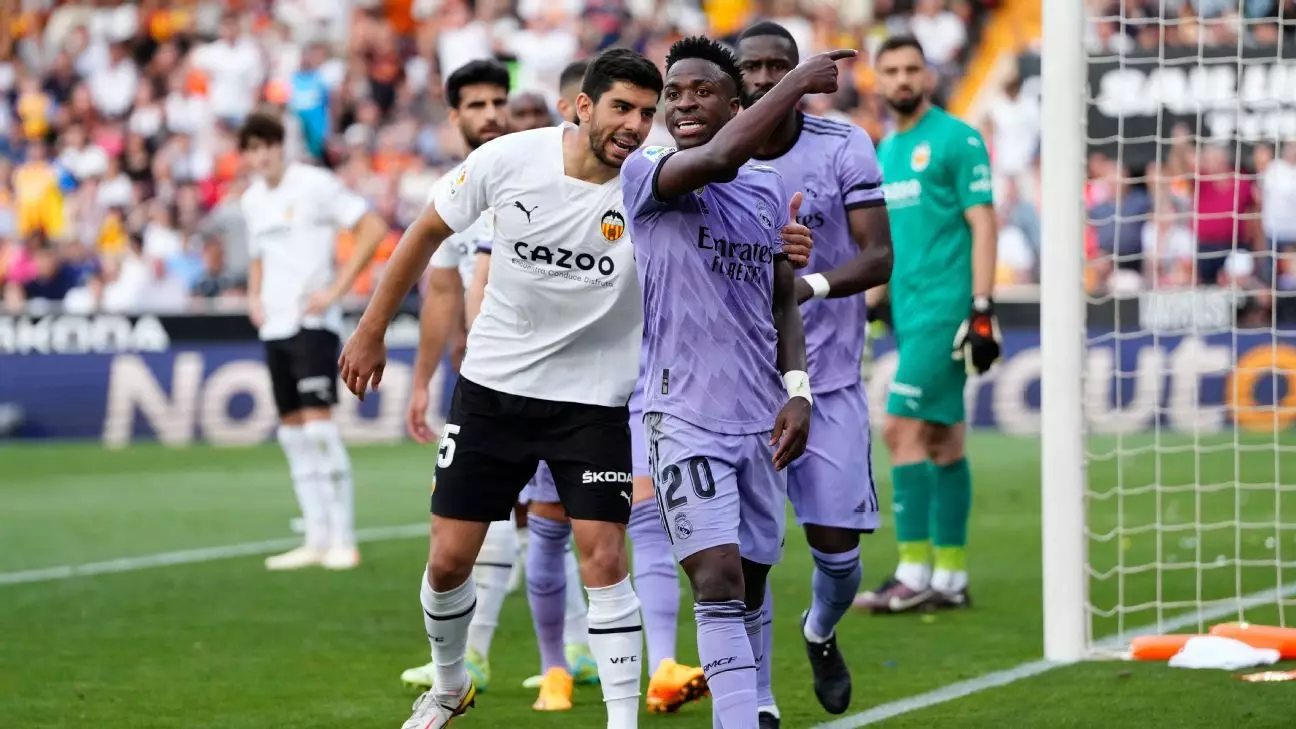In a significant step forward in the battle against racism in football, LaLiga, in collaboration with the Spanish Football Federation (RFEF), has announced the adoption of FIFA’s “No Racism” gesture by referees. This gesture, which involves crossing one’s arms, was officially sanctioned at FIFA’s congress in Bangkok in May 2024 and is now set to be implemented within Spain’s footballing framework. As incidents of racist abuse continue to mar the sport, particularly within LaLiga, this initiative represents an essential move towards establishing a formalized response to such unacceptable behavior.
The urgency of this initiative stems from a series of troubling events that have drawn attention to the prevalence of racism in Spanish football. Vinícius Júnior, the prominent Real Madrid forward, has been at the forefront of this discourse, advocating for more robust actions against racial abuse. His experiences, particularly the infamous incident at Valencia’s Mestalla Stadium in May 2023, where three fans were sentenced to prison for racially abusing him, have highlighted a pressing need for systemic change in how these episodes are handled. This verdict marked a pivotal moment in Spanish sports history, being the first of its kind, and it underscores the potential for legal repercussions against offenders.
Despite these developments, Vinícius has expressed his disappointment with the overall response from LaLiga, labeling racism as a pervasive issue within the league. His assertion that “racism is normal in LaLiga” has intensified scrutiny of the league’s policies and practices regarding fan behavior. The league’s president, Javier Tebas, has publicly refuted this claim, calling for the Spanish government to empower LaLiga with stronger tools for direct punishment of racist offenders.
The introduction of the “No Racism” gesture aligns with FIFA’s newly established three-step protocol designed to address instances of racial abuse during matches. In the first step, officials will utilize the gesture to pause the game and issue a warning via the stadium’s public address system, signaling that continuation of such behavior could lead to further sanctions. If the behavior persists, the game would enter a temporary suspension, requiring players to retreat to their dressing rooms while the situation is assessed. The final step could lead to the definitive abandonment of the match, contingent on discussions with security personnel and club officials.
This structured approach aims not only to discourage racist behavior but also to prioritize player safety and the integrity of the game. Players, like Vinícius, have voiced their willingness to walk off the pitch if subjected to racist hostility, reinforcing the need for decisive actions against offenders. It is a testament to how deeply unwelcoming environments can compromise the professional experience of athletes, necessitating immediate and practical solutions.
Broader Implications and Future Considerations
Vinícius’s sentiments extend beyond the current landscape of Spanish football. He has boldly suggested that if systemic changes are not observed by 2030, Spain should be stripped of its right to host the World Cup. His argument posits that without an environment conducive to player safety and dignity, the nation should reevaluate its standing as a prospective host for international tournaments. This statement not only reflects his personal experiences but also speaks to a larger demand for accountability and reform on a global scale.
While it is vital to recognize the efforts being made to combat racism, the road ahead remains fraught with challenges. The sport’s governing bodies must sustain their commitment beyond mere gestures and integrate these protocols into the sporting culture to foster inclusivity. Real change requires continuous dialogue, education, and a zero-tolerance approach to racism at all levels of the game—from fans to officials to players.
Ultimately, the launch of FIFA’s “No Racism” gesture within LaLiga marks a crucial beginning in a long-overdue war against racism in football. The hope is that it will trigger a transformative response among players, clubs, and fans alike, moving towards a more inclusive and respectful society. It’s imperative that all stakeholders recognize their role in this collective effort to ensure that football remains a sport that celebrates diversity, rather than one that allows prejudice to prevail. The time for change is now, and lasting progress depends on unwavering commitment from every corner of the footballing community.

